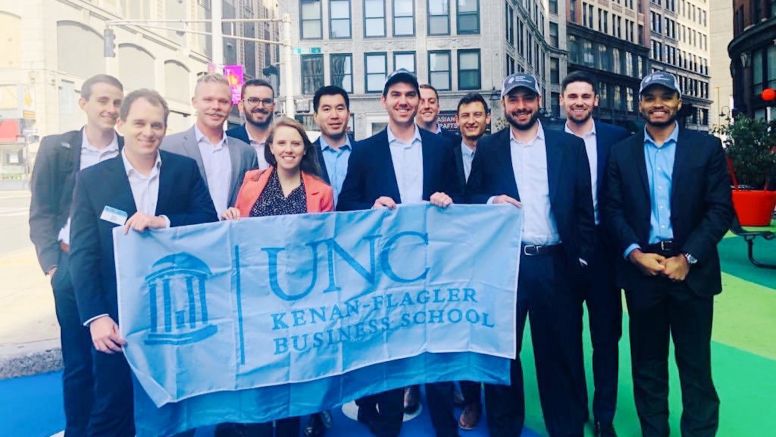Perspectives
The business of energy

News about energy – the vast business that powers the global economy – fuels discussions in classrooms at UNC Kenan-Flagler.
UNC Kenan-Flagler prepares Full-Time MBA Program graduates – through the energy concentration and Energy Center – to assume leadership roles within the ranks of multinational corporations, independent producers, power generators, renewables firms, and financial and consulting firms that do business with energy-related companies.
 A comprehensive curriculum taught by energy practitioners sets UNC Kenan-Flagler apart in the field, says Stephen Arbogast, professor of the practice of finance and the concentration leader. He brings a blend of academic and business experience to the School after working in finance for Exxon Mobil for more than three decades and teaching MBA students for many years.
A comprehensive curriculum taught by energy practitioners sets UNC Kenan-Flagler apart in the field, says Stephen Arbogast, professor of the practice of finance and the concentration leader. He brings a blend of academic and business experience to the School after working in finance for Exxon Mobil for more than three decades and teaching MBA students for many years.
>> Learn more about the MBA Energy concentration
“Our Energy Concentration is the only program at a business school taught entirely by industry veterans,” he says. “We equip students with the technical knowledge needed to decode energy issues and apply their skill sets to the industry’s economic challenges.”
Students explore every aspect of the energy value chain – from oil and gas to power, petrochemicals and renewables. Courses focus on the “business of energy” – commercial and economic factors crucial to making money in all energy sectors. They also examine the coming “energy transition” in which the objectives of economic development, climate change and energy security compete for priority.
“The energy business is foundational to modern life and how we conduct it will greatly impact the quality of life across the globe. We are going to need a special generation of energy executives to guide us through this transition.”
“The tensions inherent in this competition strongly suggest that tomorrow’s energy business will need to be quite different from today’s,” says Arbogast. “Our students engage in open, non-ideological conversations on all questions related to this energy transition, from how to earn the cost of capital in oil-and-gas exploration to whether wind/solar plus storage can de-carbonize electric generation on a cost-effective basis.”
I’m interested.
Complete the fields below and we’ll be in touch with more information about our Full-Time MBA program. Fields marked with “*” are required.
Trifecta for career success
Internships, energy conferences and research opportunities complement the coursework.
Events give students unique access to industry leaders and are built around key questions to which answers are unclear. “In 2016 we explored whether the U.S. oil share revolution would ‘go global,’” says Arbogast. “In 2018, the questions were around the all-in costs of driving wind/solar deep into electricity generation and the lowest cost path for doing so. In 2019, we inquired as to whether new technologies for carbon capture were ready for commercial deployment.”
Students conduct research studies in advance of the events and present their findings at the conference. “This work further burnishes both their expertise and their credentials in the energy field,” says Arbogast.
The MBA Energy Club is a vital part of the learning experience. Student leaders organize seminars, networking events and case competitions for classmates pursuing careers in the energy industry. They also conduct treks to energy firms in Boston, Washington D.C., Charlotte and Houston.
“The energy business is foundational to modern life and how we conduct it will greatly impact the quality of life across the globe” says Arbogast. “We are going to need a special generation of energy executives to guide us through this transition.”
Grounding students in the business of energy and the energy transition adds up to a unique preparation. “Our priority is to prepare our graduates to hit the ground running and advance rapidly within any energy business,” says Arbogast. “The concentration curriculum amounts to the equivalent of two to three years of in-house training courses at a firm.”
“Our students have very different conversations with recruiters about the business of energy – and our graduates are ready to make an impact on the job from day one,” says Arbogast. They work on issues and problems they’ve already discussed and analyzed here at UNC Kenan-Flagler.”
The results can be seen in the career outcomes for UNC Kenan-Flagler alumni: A 2019 graduate is Duke Energy’s primary rate-making advisor, succeeding an executive with decades of experience. Other successful graduates work in gas marketing strategy in Brazil and the U.S. Permian basin for ExxonMobil; global environmental, social and government stewardship for Schlumberger; and consulting assignments to nuclear utilities for ScottMadden.
The trifecta of the concentration, the center and the career club help UNC Kenan-Flagler energy students prepare for the immense challenges of the energy business and help them determine where in the value chain they are best suited to serve.